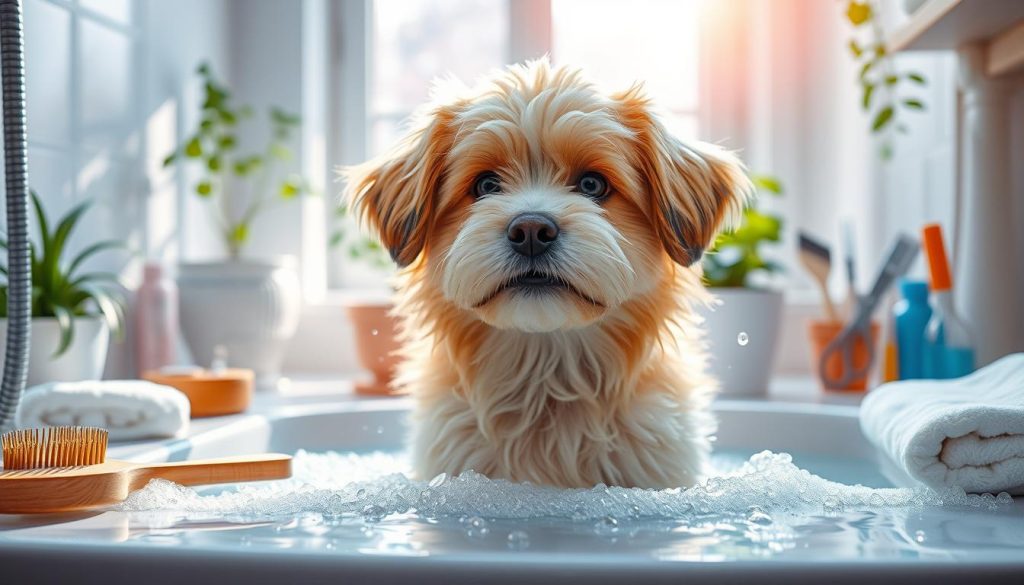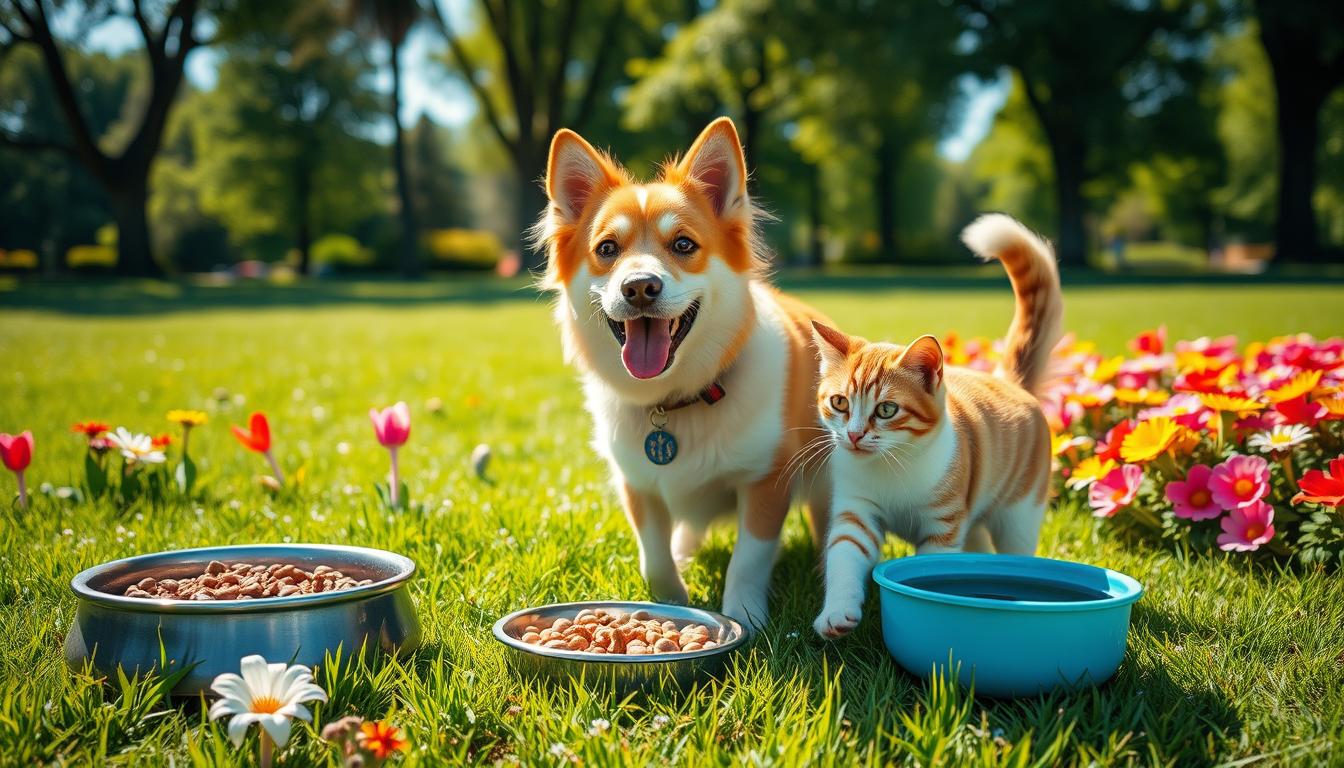As a devoted pet owner, I know how crucial it is to keep our pets healthy. I’m excited to share a guide with expert tips to boost your pet’s well-being. Whether you have a dog, cat, or any other pet, you’ll find useful info to help them thrive.
In this article, we’ll cover key aspects of pet health. This includes pet nutrition, pet exercise, pet grooming and hygiene, and pet preventive care. By using these strategies, you can ensure your pet lives a happy, healthy life.
Let’s dive in and explore how to elevate your pet’s health! With the right knowledge and dedication, you can give your furry friend the care they deserve.
Introduction to Pet Health and Well-being
Keeping our pets healthy is a big deal for us pet owners. It’s crucial for their long, happy lives and for our own happiness too.
Why Pet Health Matters
Looking after your pet’s health is key to their happiness. If you ignore their health needs, they might suffer from pain, discomfort, or even serious illnesses. By taking care of their health early, you can make sure they live a long, joyful life with you.
The Benefits of a Healthy Pet
A healthy pet brings joy and energy into your life. They’re more active and fun to be around. This means you get to be more active and mentally sharp too.
When your pet is healthy, your bond with them grows stronger. This makes your relationship more rewarding and fulfilling. Taking care of your pet’s health through good food, exercise, and vet visits saves you money and stress. It makes your life together happier and healthier.
Nutritional Needs for Optimal Pet Health

Proper pet nutrition is key for your furry friend’s health. It’s important to know what your pet needs based on their age, breed, and how active they are. A balanced diet helps your pet live a long, healthy life.
Every pet is different when it comes to nutrition. Puppies and kittens need different things than adult or senior pets. Active dogs might need more protein and calories than less active ones.
Finding the right pet food can be hard with so many choices. Reading labels and understanding ingredients is crucial. Choose high-quality, nutrient-dense foods that offer a complete and balanced diet. Stay away from fillers, additives, and by-products that don’t add much nutritional value.
Adding healthy supplements can also be beneficial. They can help fill any nutritional gaps your pet might have. Always talk to your vet before adding any supplements to your pet’s diet.
| Nutrient | Importance for Pets |
|---|---|
| Protein | Supports muscle growth and maintenance, immune function, and overall health. |
| Fats | Provide energy, support skin and coat health, and aid in the absorption of vitamins. |
| Carbohydrates | Serve as a source of energy and help maintain healthy digestion. |
| Vitamins and Minerals | Support a variety of bodily functions, including immune system, bone health, and organ function. |
Knowing your pet’s nutritional needs and feeding them a balanced diet is vital. It ensures your pet stays healthy and full of energy. Work with your vet to create a pet nutrition plan that fits your pet’s needs.
Pet Health: Exercise and Activity
Keeping your pet healthy and active is key. Regular exercise keeps them fit, mentally sharp, and happy. We’ll look at different exercises and offer tips to add them to your pet’s daily life.
Types of Exercise for Different Pets
The right exercise for your pet depends on their type, breed, and needs. Dogs need lots of activity like running or playing fetch. Cats prefer shorter play sessions with toys. Small animals like hamsters enjoy exploring and burrowing in big habitats with tunnels and wheels.
- For dogs, consider activities like walking, jogging, swimming, or playing fetch.
- Cats enjoy interactive playtime with wand toys, scratching posts, and indoor cat trees.
- Small pets like hamsters and guinea pigs benefit from exercise wheels, tunnels, and safe, supervised playtime in a secure area.
Incorporating Exercise into Your Pet’s Routine
To keep your pet active, make exercise a daily habit. Short sessions throughout the day keep them energetic and interested. Involve your family in these activities to make them fun for everyone.
| Pet Type | Recommended Exercise Duration | Frequency |
|---|---|---|
| Dogs | 30-60 minutes per day | Once or twice a day |
| Cats | 15-30 minutes per session | Multiple short sessions throughout the day |
| Small Pets | 30 minutes per day | Once a day, with additional playtime |
The right exercise for your pet depends on their age, health, and likes. Talk to your vet to create a plan that suits your pet’s needs and helps them stay healthy.
Pet health

As a pet owner, keeping your furry friend healthy is key. This includes preventive care and managing chronic conditions. Here, I’ll share tips to keep your pet happy and healthy.
Preventive care is vital. Regular vet visits can spot health issues early. These visits include physical checks, shots, and talks about your pet’s health.
Dealing with chronic conditions in pets is tough. But, with the right plan, your pet can do well. Work with your vet to create a treatment plan. This might include meds, diet changes, or special therapies.
It’s important to know when your pet is sick or upset. Look for signs like changes in appetite, tiredness, or odd behavior. Catching these signs early can help your pet get the care they need.
| Pet Health Essentials | Preventive Measures | Common Pet Health Issues |
|---|---|---|
|
|
|
By being informed and proactive, you can ensure your pet lives a long, happy life. Your vet is a great resource. Don’t hesitate to ask questions or share concerns.
Grooming and Hygiene for a Healthy Pet

Keeping your pet clean and well-groomed is key to their health. Good grooming and hygiene stop many skin, coat, and dental problems. This keeps your pet happy and healthy.
Brushing and Bathing Tips
Brushing your pet regularly is vital. It gets rid of loose hair and spreads natural oils. This keeps their coat shiny and healthy. Brushing frequency depends on your pet’s breed and coat type.
When bathing, use a gentle, safe shampoo. Make sure to rinse all suds off. Don’t bathe too often, as it can dry out their skin.
Dental Care for Your Pet
Pets need dental care just like people do. Brushing their teeth and dental check-ups prevent plaque and gum disease. Use pet-safe toothbrushes and toothpaste for their dental care.
| Grooming Task | Frequency | Benefits |
|---|---|---|
| Brushing | Daily or a few times a week | Removes loose hair, distributes natural oils, and keeps the coat looking healthy |
| Bathing | As needed, typically every 4-6 weeks | Helps keep the skin and coat clean, removes dirt and odors |
| Dental Care | Daily tooth brushing, annual veterinary check-ups | Prevents plaque buildup, gum disease, and other dental issues |
Preventive Care: Vaccinations and Check-ups
Keeping your pet healthy is very important. Regular vet visits and shots are key to keeping them happy and well. By focusing on pet preventive care, you can catch and stop health problems early. This saves time, money, and stress.
Veterinary pet vaccinations protect against many diseases. Your vet will suggest a vaccination plan based on your pet’s needs. Shots like rabies and distemper keep your pet safe and give you peace of mind.
Regular pet check-ups and pet wellness exams are also crucial. Your vet will do a full check, look for illness or injury, and offer advice for your pet’s health. These visits help keep your pet at their best.
- Vaccination schedule: Puppies and kittens need shots starting at 6-8 weeks, with boosters later.
- Routine check-ups: Adult pets should see the vet yearly or every two years for health checks.
- Early detection: Early care can spot health issues when they’re easier and cheaper to treat.
By focusing on pet preventive care, you’re making a big investment in your pet’s future. Regular vet visits and shots mean your pet can live a long, happy, and healthy life.
| Preventive Care | Benefits |
|---|---|
| Vaccinations | Protect against infectious diseases |
| Check-ups | Monitor overall health and detect issues early |
| Wellness Exams | Personalized recommendations for optimal well-being |
Tackling Common Pet Health Issues
Even the most caring pet owners can face unexpected health problems with their pets. It’s key to know the signs and symptoms of health issues. Recognizing these early can help you act fast and get your pet the care they need.
Signs and Symptoms to Watch For
Keep an eye out for any changes in your pet’s behavior or looks. This might include being very tired, not wanting to eat, vomiting, diarrhea, or scratching too much. Also, watch for any unusual lumps or growths.
Changes in breathing can also be a sign of health problems. Look for signs of pain or discomfort like limping, not wanting to move, or making noise when touched. Changes in sleep, grooming, or energy levels could also mean a health issue.

